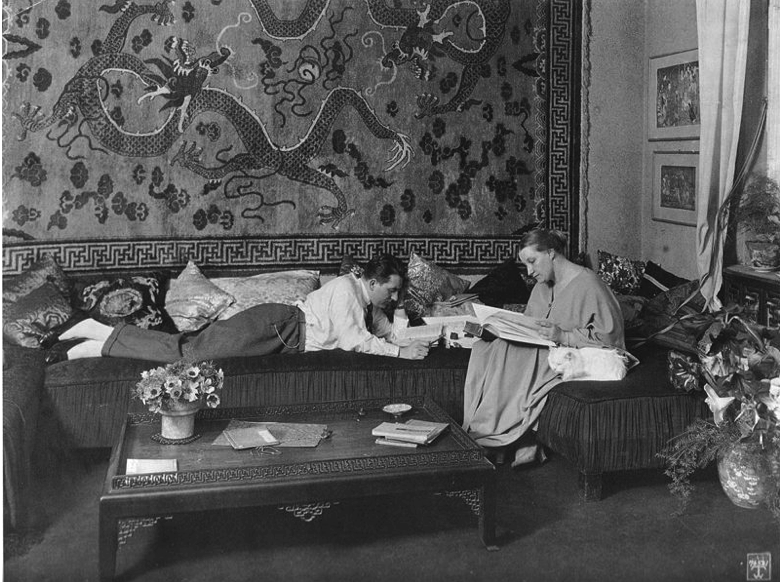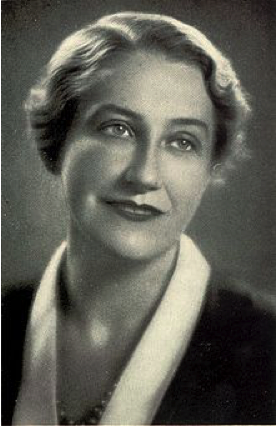This is the second installment of the series WIGS IN SPACE: WOMEN AND SCI-FI from our resident Con Gal, Heather. If you missed her first installment, make sure to check it out here. This isn’t your run-of-the-mill Star Wars or Star Trek story. Nope. Heather has dug deep and found some pretty cool stories here. It’s quite a ride — twisted, strange, and not black-and-white. Enjoy!
THE STRANGE TALE OF THEA VON HARBOU and the making of METROPOLIS
By HEATHER MCHALE
Okay guys settle in because this one gets more than a little weird.
Thea von Harbou was born in 1888 in Germany. She was privileged, precocious and well educated. As a young woman she pursued a career in acting against the wishes of her conservative family. By 1920 she was married, living in Berlin and pursuing a successful writing career, when was approached by German director Joe May to adapt one of her short stories for the screen. The rest was history and Thea quickly became a prolific and critically acclaimed screenwriter. She had a unique technical style and was often praised for her ability to write in a way that was extraordinarily visual. She adapted to writing for the screen in a way that many writers of the time were never able to do.
Joe May introduced Thea to Fritz Lang. Fritz was already a rising star in the German film industry and he was married to Lisa Rosenthal. However, it wasn’t long before Thea and Fritz struck up not only a romance but a remarkable artistic collaboration that would last for years. In 1920 Thea divorced her husband and continued her affair with Fritz. Things took a strange and dark turn however in 1921 when Fritz’s wife committed suicide under suspicious circumstances. Fritz and Thea were the only witnesses to this incident and many people were never satisfied with the official ruling of suicide and many claimed for years to suspect that Fritz had murdered his first wife. Fritz quickly recovered from this tragedy and by 1922 he and Thea were married. The bloom wore off the rose quickly though and Thea would later say that “we were married for 11 years because for 10 years we didn’t have time to get divorced.” It wasn’t long before Fritz was openly chasing younger women and keeping an apartment in their building for his mistress just as he had done with Thea years before.

Thea and Fritz in their Berlin Flat 1923 or 1924.
Romantic disaster aside, their artistic partnership and collaboration was one that would quickly set the film world on fire. They had an extraordinary partnership and Thea would go on to write and help produce all of Fritz’s films between 1920 and 1933. Most important of these being Metropolis in 1926 and M in 1929. Metropolis would go on to become one of the most important, groundbreaking and foundation building films for the budding film industry. Critics have spent decades dissecting and analyzing the political, social and psychological layers of this masterpiece.
M was Thea’s baby. It was based on a real killer who was active in Düsseldorf at the time. Thea was obsessed with this case and would go every day to the police station to follow up on leads and because she was so well-known the police would share information with her. The result was M; a groundbreaking, disturbing thriller about mob justice and arguably one of the earliest examples of the film noir genre. Thea was not credited for her work for on this film.
Fritz and Thea had been estranged for years although their artistic partnership continued. Thea eventually met and fell in love with a young Indian doctoral candidate 17 years her junior, Avi Tendulkar. It wasn’t until Fritz discovered this affair that he insisted on finalizing their divorce in 1933. Fritz divorced Thea and quickly fled Germany. The reasons for this are not entirely clear. According to Fritz, he fled following a job offer from Goebbels that he did not wish to take. Thea had joined the Nazi party and Fritz would later say that he fled fearing her fanatical devotion to the Party. However, this does not exactly fit with what little is known about Thea and her life following Fritz’s departure. According to Thea, she joined the Nazi party so that she could use her social power and influence to help and support Indian immigrants into Germany including the man she loved.
Fritz would go on to become one of the greatest auteurs of the 20th century. He was lauded, critically acclaimed and extremely talented. However, it was an open secret that Fritz was a mercurial, tempestuous and tyrannical director who frequently abused his cast, his crew and anyone around him. Meanwhile, back in Germany, Thea went on working through the war writing comedies and working with the biggest names in the German film industry during World War II. Due to the destruction caused by the war not much is actually known about her work activities during the war. She volunteered making hearing aids and bringing meals to those injured by the bombings. After the war she spent a brief period of time in a British prison camp which was due course for well-known members of society who had also been in the Nazi party. After the war she volunteered clearing rubble from bombed out buildings. Eventually she went back to writing and continued a successful career as a novelist and writer. She died in Berlin in 1954 at 65, after a fall outside a theater where one of her films was being played.
Thea was a member of the Nazi party through the war and according to rumor there were two pictures hanging in her office; one of Hitler and one of Gandhi. Personally I think you would have been hard-pressed to find any public office in Germany during World War II that did not have a portrait of Hitler in it. I find it difficult to reconcile the motives of someone who was famously and unabashedly in love with an Indian man and an open admirer of Gandhi and his philosophies with Nazism.
The narrative that has been widely accepted by the industry by a society is Fritz’s; that he fled Germany fearing his crazy Nazi wife and he would later go on to alternately undermine and praise Thea’s contribution to his work. Meanwhile, Thea never spoke publicly about her relationship with Fritz, their partnership or anything to do with the films that they made together. We all know that history is written by the victor and for better or worse Fritz was the victor here and it’s his narrative that has been accepted. Thea’s story has been lost to time, to war and to the indifference that our society has always had for the contributions of women. I can’t say for sure how Thea felt about the Nazis. I know that she was proud of where she came from, that she was an outspoken feminist and that she felt deeply for working people and their plight. She loved a young man whose family were in difficult circumstances and she did her best to make life better for them.
Personally, I find it hard to believe that Thea was truly a Nazi in the sense that she believed their hateful rhetoric and white supremacist agenda. I believe that Thea was a survivor. She was living in an uncertain and difficult time, especially for women. It is likely she was just doing the best she could to protect the lives of those she loved and the career that she had spent decades building. A career that not many women were granted access to. She spent her life in a precarious position and I can only wonder what choices I would make in that scenario.
Nazis are evil, I’m not disputing that. However, I think it is long past time that the accepted narrative for Thea’s life and work be challenged. The film industry has long recognized the contributions of female Nazi filmmaker Leni Riefenstahl whose work and beliefs were overtly in-line with the white supremacist notions of the Third Reich. Her accomplishments and artistry have outweighed her political affiliations when it comes to acknowledging her contribution to the film industry.
It is baffling to me that Thea has not been granted the same benefit of the doubt considering her contributions to science fiction and to the film industry as a whole were groundbreaking. I’m not saying she was a perfect person or even necessarily a good one. However, should we be satisfied with just accepting the word of an estranged, abusive ex-husband of, admittedly above average talent but below average character? Fritz’s talent and artistic mastery have long outweighed his abusive and suspect character and have allowed him to be memorialized in history for his contributions to the art of filmmaking. Thea Gabriele von Harbou deserves nothing less than the same consideration.


